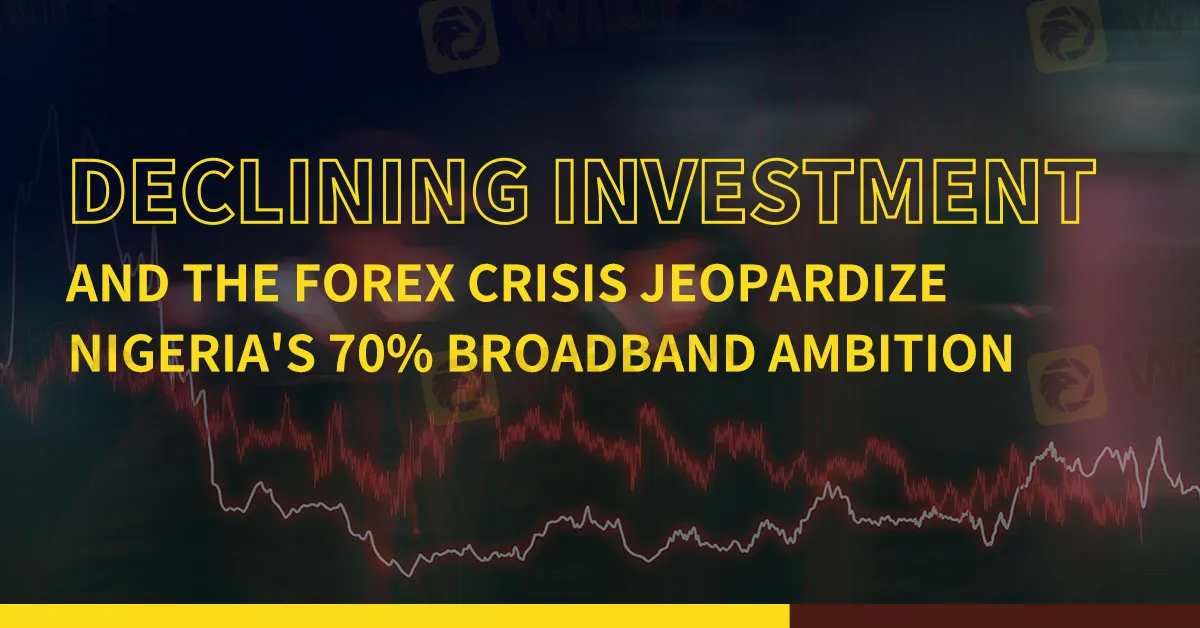简体中文
繁體中文
English
Pусский
日本語
ภาษาไทย
Tiếng Việt
Bahasa Indonesia
Español
हिन्दी
Filippiiniläinen
Français
Deutsch
Português
Türkçe
한국어
العربية
DECLINING INVESTMENT AND THE FOREX CRISIS JEOPARDIZE NIGERIA'S 70% BROADBAND AMBITION.
Abstract:The prolonged FX crisis is making it difficult for Nigeria to attain 70% internet penetration by 2025 and is impeding further investments in telecom infrastructure.

The prolonged FX crisis is making it difficult for Nigeria to attain 70% internet penetration by 2025 and is impeding further investments in telecom infrastructure.
The depreciating value of the Naira combined with foreign direct investments (FDIs) into the telecom sector has reduced operators' ability to invest in equipment.
The National Bureau of Statistics (NBS) recently released data showing foreign direct investments (FDIs) in the telecom industry of 70.5% in 2023.
In order to fulfill the broadband target, the Minister of Communications, Innovation, and Digital Economy stated last year that estimated $2 billion to install fiber in the entire country. But over that same time frame, the telecom sector only brought in $134.75 million in foreign direct investments.
Due to the sharp increase in the exchange, local operators are finding it difficult to import new equipment.
EFFECTS OF VOLATILITY IN FX
The operators' intentions to import equipment have been interrupted, according to Mr. Gbolahan Awonuga, Head of Operations at the Association of Licensed Telecommunications Operators of Nigeria (ALTON), by the notable increase in the value of the dollar from approximately N460 in the previous year to over N1,600 this year.
Additionally, MTN Nigeria's Chief Financial Officer, Mr. Modupe Kadri, talked about the company's intentions for infrastructure investment this year, pointing out that the currency problem makes it difficult to convince shareholders.
Now, given the dire macroeconomic circumstances we find ourselves in, it becomes difficult to defend the governance level if there is no investment case. However, we have significantly increased our spending in improving our 4G and 5G networks, and we are also adding more fiber assets, he added.
DECLINING FOREIGN DIRECT INVESTMENT
Engineer Gbenga Adebayo, the Chairman of the Association of Licensed Telecommunications Operators of Nigeria (ALTON), voiced serious concerns to Nairametrics about the declining investments in the telecom sector. He made the argument that more funding is needed for Nigeria's telecom industry to grow.
We are concerned that the National Bureau of Statistics (NBS) report from the previous year, which showed a decrease in Foreign Direct Investment (FDI). He clarified, Many facets of the sector are being impacted by the fluctuations of the exchange rate.
IN ELABORATING ON THE DECLINE IN INVESTMENTS, ADEBAYO POINTED OUT
The evident from the present investment levels. This is having a negative influence on the growth, and we are concerned that FDIs may decrease much further, which would further harm operators' performance.
He added that in addition to the decline in investment, the operators' capacity to grow and add new broadband infrastructure is being hampered by the restricted availability of FX.
70% BROADBAND PENETRATION SEEMS UNLIKELY.
Nigeria is unlikely to achieve its aim of having 10% of its population using internet by the end of the year given the declining investments and currency problems that are now plaguing telecom companies and businesses in general.
The Nigerian Communications Commission (NCC) has released data showing that 43.71% of Nigerians had access to broadband by the end of 2023.
This means that in order to meet the 70% target set forth in the National Broadband Plan (NBP 2020–2025), the nation would need to increase penetration by almost 27% between now and next year. This means that rapid infrastructure building across the board will be necessary to meet the target.
NCC data shows that penetration was 39.85% when the Plan was started in March 2020. This indicates that there has only been a 3.86% improvement in the nation's broadband connectivity over the last four years.
THE REASONS FOR ITS SIGNIFICANCE
According to a World Bank research, a nation's GDP can grow by at least 4.6% for every 10% rise in broadband coverage.
This important discovery highlights the need for Nigeria to quickly extend broadband services in order to address a number of socioeconomic issues, including economic growth, tax base expansion, and raising educational and digital literacy levels.
This justification led the Nigerian government to create the second National Broadband Plan (NBP 2020–2025) following the previous plan's successful attainment of the 30% penetration milestone (NBP 2013–2018).
The ambitious goals of the NBP 2020–2025 include reaching 15 Mbps internet speeds in rural areas and 25 Mbps internet speeds in metropolitan areas by 2025.
It also aspires to achieve 70% population penetration and the fiber connections of 90% of all Local Government Areas. Making sure that every postsecondary institution is 5 kilometers or less from a fiber point of access is another objective.
In order to further support Nigeria's technical growth and self-sufficiency, the strategy also aims to lower the average cost of data to N390/Gb or less and establish at least one local assembly or manufacturing plant for smart devices within the country.

Disclaimer:
The views in this article only represent the author's personal views, and do not constitute investment advice on this platform. This platform does not guarantee the accuracy, completeness and timeliness of the information in the article, and will not be liable for any loss caused by the use of or reliance on the information in the article.
Read more

ACY Securities Integrates MetaTrader 5 to Enhnace Copy Trading Service
ACY Securities brings a better copy trading experience with Tradingcup and MetaTrader 5, making it easier to follow expert signals and grow your trades.

Exnova Scam Alert: Account Blocked, Funds Stolen, and Zero Accountability
Exnova Forex scam exposed! Victim report blocked account and stolen funds from this unregulated broker. Learn how they operate and why you should stay far away.

WikiFX Review: Is HYCM still reliable in 2024?
HYCM is an online broker offering a wide variety of market instruments. WikiFX reviewed HYCM a few years ago. However, we wonder if this broker is still reliable in 2024 and the coming 2025. WikiFX has made a comprehension review of this broker to help you better understand the truth.

Robinhood Launches Options Trading in the UK by 2025
Robinhood to introduce options trading in the UK by 2025 following FCA approval. Discover how this expansion aligns with Robinhood's strategy for global growth and new features.
WikiFX Broker
Latest News
High-Potential Investments: Top 10 Stocks to Watch in 2025
US Dollar Insights: Key FX Trends You Need to Know
Why Is Nvidia Making Headlines Everywhere Today?
Discover How Your Trading Personality Shapes Success
FINRA Charges UBS $1.1 Million for a Decade of False Trade Confirmations
Bitcoin in 2025: The Opportunities and Challenges Ahead
BI Apprehends Japanese Scam Leader in Manila
Big News! UK 30-Year Bond Yields Soar to 25-Year High!
SQUARED FINANCIAL: Your Friend or Foe?
Join the Event & Level Up Your Forex Journey
Currency Calculator






